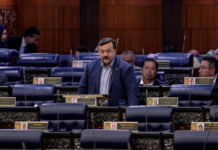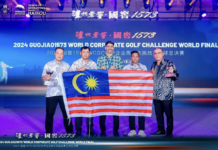KUALA LUMPUR, April 2 — Malaysia and China have signed the Memorandum of Understanding on the Establishment of a High-Level Committee to Promote Cooperation in the Post COVID-19 Era – a historic development in Malaysia-China relations and the first of its kind for Malaysia.
The MoU was inked during a meeting between Malaysian Foreign Minister Datuk Seri Hishammuddin Tun Hussein and his Chinese counterpart – state councillor and Foreign Minister Wang Yi – in Fujian, China, on Thursday. Hishammuddin’s two-day visit to China is on the invitation of Wang Yi.
During their joint press conference on Thursday, Hishammuddin said pursuant to the MoU, the High-Level Committee on Post COVID-19 Cooperation was also established, co-chaired by him and Wang Yi.
The committee will act as an overarching bilateral mechanism, overseeing the implementation of all understandings and provide policy guidance for all aspects of Malaysia-China relations moving forward.
“This will include, among others, pandemic preparedness and response, trade and investment, commodity, food security, science, technology and innovation, travel facilitation and “Belt and Road” initiative projects,” he said.
He stated that efforts will initially focus on laying a solid foundation for reciprocal visits by leaders of both countries, for Malaysian Prime Minister Tan Sri Muhyiddin Yassin’s official visit to China soon, and for the leadership of China to visit Malaysia.
Meanwhile, on vaccine cooperation, Hishammuddin thanked President Xi Jinping’s pledge to make safe and affordable vaccines a “global public good”, adding that Malaysia has procured two types of Chinese-made vaccines – SinoVac and CanSino.
“Following our meeting today, we are now considering to add the amount and further expand the application of second and third-generation Chinese-made vaccines,” he said.
Principally, both countries have also agreed on mutual recognition of their vaccination digital certificates, or COVID-19 health certifications, which will further facilitate cross-border movement between Malaysia and China in the near future, he said.
“From our discussions today, Wang Yi and I have agreed that more in-depth discussions must be done by all stakeholders which involve many agencies and ministries before an announcement can be made on both our leaders soon to realise this pledge,” he said.
The discussion also centered around the future expansion of the Malaysian Palm Oil trade with China, said Hishammuddin, adding that Malaysia is pleased with Beijing’s commitment to open up the Red Palm Oil (RPO) segment of the Chinese market with the new Group Standard for RPO.
“I understand Malaysia is the only nation that produces RPO, so it is my sincere hope that Malaysian exporters will grasp this golden opportunity to export RPO to China,” he said.
Under the newly established high-level committee, both ministers also deliberated on several other matters including food security where collective effort is needed to ensure a sustainable global supply chain, ensuring equal physical and economic access to sufficient, safe and nutritious food.
“Malaysia is embarking on an International Food Security Coalition (IFSC) and we look forward to China’s participation once the relevant agencies look into building this comprehensive ecosystem at the bilateral level,” he said.
On trade and investment, Hishammuddin said both ministers are pleased with Chinese Premier Li Keqiang’s interest on Malaysia’s efforts to enhance the Tanjung Malim and Pagoh Comprehensive Automotive Hubs which will be linked with the ASEAN Automotive Valley (AAV).
In the same vein, Hishamuddin also informed his counterpart that Malaysia has launched the One Stop Centre (OSC) to facilitate short-term business travellers, which will allow swift recovery and reactivation of business connectivity as well as activities between Malaysia and the world, including with China.
“To date, the OSC has received great number of applications and Malaysia would like to encourage more Chinese entrepreneurs to make use of this safe, friendly and seamless facility,” he said.
On cross-border travel, both sides have agreed to finalise the standard operating procedures (SOP) and early conclusion to negotiations on a Reciprocal Green Lane (RGL) between Malaysia and China.
Hishammuddin said he also conveyed to his counterpart the need for Malaysian students to return and continue their studies in China, as well as many families who are waiting to be reunited with their loved ones.
“I would like to thank Wang Yi on his personal commitment to resolve the matter expediently following consultations with the relevant health and border authorities,” he said.
















